| Srl | Item |
| 1 |
ID:
036157
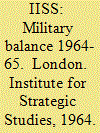

|
|
|
|
|
| Publication |
London, Institute for Strategic Studies, 1964.
|
| Description |
43p.pbk
|
| Contents |
Acc. No. 015107 (Include in this Volume) : 1964-1965
Acc. No. 000061 (Include in this Volume) : 1966-1967
Acc. No. 005530 (Include in this Volume) : 1967-1968
Acc. No. 014447 (Include in this Volume) : 1968-1969
Acc. No. 003127 (Include in this Volume) : 1969-1970
Acc. No. 009779 (Include in this Volume) : 1971-1972
Acc. No. 011871 (Include in this Volume) : 1973-1974
Acc. No. 013676 (Include in this Volume) : 1974-1975
|
|
|
|
|
|
|
|
|
|
|
|
Copies: C:1/I:0,R:1,Q:0
Circulation
| Accession# | Call# | Current Location | Status | Policy | Location |
| 015107 | 355.03/IIS 015107 | Main | On Shelf | Reference books | |
|
|
|
|
| 2 |
ID:
161351
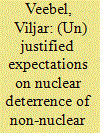

|
|
|
|
|
| Summary/Abstract |
Nuclear assets are one of the cornerstones of credible collective deterrence of the North Atlantic Treaty Organisation. Paradoxically, the most endangered member states are the ones without nuclear capabilities, left with the hope and expectation that the owners of nuclear assets will defend them and that their potential enemies are deterred by these capabilities. However, the expectations from one side, practical commitment of allies from other side may not go in harmony and synchronisation. Is there a capability gap which needs to be fulfilled? If yes then, is the gap in the side of nuclear powers or is it on the side of those endangered states who need to understand what can or cannot realistically be expected? The current article focuses on the question of how the political and military elite of the Baltic states describes their expectations in terms of using Alliance's nuclear capabilities to deter Russia's regional ambitions.
|
|
|
|
|
|
|
|
|
|
|
|
|
|
|
|
| 3 |
ID:
102352
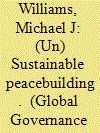

|
|
|
|
|
| Publication |
2011.
|
| Summary/Abstract |
Since the collapse of the Soviet Union, NATO has progressively adapted itself
to the new strategic environment. This has meant a shift from a defensive
posture to a more proactive risk management strategy. A key
component of this mandate is contributions to international peacemaking
and peacebuilding operations. In both the Balkans and Afghanistan, NATO
has worked to utilize its military assets to create and maintain peace so
that civilian organizations can administer aid, development programs, and
good governance projects. These multifaceted operations, however, are
complex and rely on well-structured relationships between the different
civilian-led international organizations on the ground and NATO. Sadly, as
the case of Afghanistan illustrates, these organizations have proved woefully
inadequate in terms of providing sustainable peacebuilding. The hypothesis
is that international organizations do not play well on the ground
in conflict or postconflict environments because they were meant to manage
a balance of power, rather than an absence of power. These organizations
are more worried about their bureaucratic turf than they are
sustainable outcomes.
|
|
|
|
|
|
|
|
|
|
|
|
|
|
|
|
| 4 |
ID:
006795
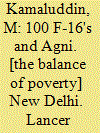

|
|
|
|
|
| Publication |
New Delhi, Lancer Publichers, 1996.
|
| Description |
x, 203p.
|
| Standard Number |
18978292248
|
|
|
|
|
|
|
|
|
|
|
|
Copies: C:1/I:0,R:0,Q:0
Circulation
| Accession# | Call# | Current Location | Status | Policy | Location |
| 038641 | 355.02/KAM 038641 | Main | On Shelf | General | |
|
|
|
|
| 5 |
ID:
106148
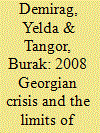

|
|
|
| 6 |
ID:
173285
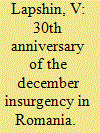

|
|
|
|
|
| Summary/Abstract |
CIVIL UNREST in Timişoara in December 1989 became the detonator in the explosive sociopolitical situation that had taken shape in Romania by the end of the 1980s. Nicolae Ceauşescu reacted in a resolute and uncompromising way - the disturbances had to be suppressed at any cost. They weren't an ordinary expression of discontent. There had been developments in Romania's neighborhood that were endangering the country's leadership: in the Soviet Union perestroika was gaining momentum with its new wave of revisions of the past, including the roles of former leaders, and setting a bad example to communist parties in other countries.
|
|
|
|
|
|
|
|
|
|
|
|
|
|
|
|
| 7 |
ID:
015936
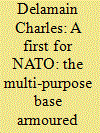

|
|
|
|
|
| Publication |
April 1993.
|
| Description |
52-56
|
|
|
|
|
|
|
|
|
|
|
|
|
|
|
|
| 8 |
ID:
090673
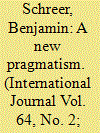

|
|
|
|
|
| Publication |
2009.
|
| Summary/Abstract |
The analysis here examines the major factors leading to a change in Germany's approach towards the alliance. It proceeds in three broad steps. First, evidence for a shift in German NATO policy is provided. Second, the most important external and domestic factors affecting German behaviour in NATO are identified. In the final section, some predictions for future German NATO policy are made, as well as some implications for the alliance as a whole.
|
|
|
|
|
|
|
|
|
|
|
|
|
|
|
|
| 9 |
ID:
192142
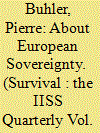

|
|
|
|
|
| Summary/Abstract |
The coining of the concept of ‘European sovereignty’ by French President Emmanuel Macron in 2017 has prompted a heated debate, reviving disputes over supranationality, the nation-state and democracy that have resonated since the inception of the European project. Macron’s intervention came at a time when a flurry of crises compelled the European Union to move from its ambition of being a ‘normative power’ to living through its ‘Machiavellian moment’, against the backdrop of the rise of new global powers and existential threats for the security of the Union and its member states. But the term ‘European sovereignty’ is a misnomer. The real issue is one of power, not of sovereignty. Power proceeds from command, hardly an attribute of the complex shared decision-making process of the EU, leaving the objective of becoming a fully-fledged power out of reach for the European polity.
|
|
|
|
|
|
|
|
|
|
|
|
|
|
|
|
| 10 |
ID:
150236
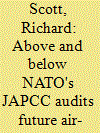

|
|
|
| 11 |
ID:
117411
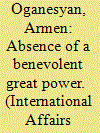

|
|
|
|
|
| Publication |
2012.
|
| Summary/Abstract |
AMERICAN AUTHOR Anne O'Hare McCormick (1880-1954), whose life experience was interwoven with both world wars, packaged into a single phrase the lessons to be derived from the tumultuous epochs when she famously wrote: "Today the real test of power is not capacity to make war but the capacity to prevent it."
|
|
|
|
|
|
|
|
|
|
|
|
|
|
|
|
| 12 |
ID:
102392
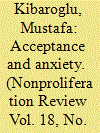

|
|
|
|
|
| Publication |
2011.
|
| Summary/Abstract |
US nuclear weapons have been an important part of Turkey's security strategy since their first deployment on Turkish soil in the early 1960s. Turkey's NATO membership and its close relationship with the United States have been perceived to be integral to maintaining its security. The release of the 2010 US Nuclear Posture Review (NPR), with its focus on disarmament and reduced reliance on nuclear weapons, has a number of potential consequences for Turkey. This article provides background on the history of Turkish-US nuclear weapons policy in light of issues ranging from Middle Eastern politics to the development of NATO's new Strategic Concept. It then describes how actors in the government, military, and academia in Turkey have reacted to the NPR, why they reacted as they did, and how the Obama administration's initiatives may be received in Turkey in the future. This article concludes that both military and civilian actors in Turkey have reacted favorably to the NPR and are pleased by its emphasis on nuclear nonproliferation and the maintenance of extended deterrence; however, there is less agreement in Turkey about the emphasis placed by the NPR on the danger of nuclear terrorism.
|
|
|
|
|
|
|
|
|
|
|
|
|
|
|
|
| 13 |
ID:
145942
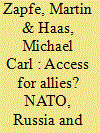

|
|
|
|
|
| Summary/Abstract |
One of the most important debates currently underway within NATO focuses on the extent to which the Alliance should have a forward presence of Allied combat forces in the exposed Baltic States. Limited-presence arrangements are likely to fall short of their deterrent purpose if they fail to account for Russia’s growing ability to threaten NATO’s operational access to the Baltics. Martin Zapfe and Michael Carl Haas argue that any NATO strategy of assured access would face significant hurdles and come at a price. Although it could considerably strengthen conventional deterrence, such a strategy would be liable to exacerbate the regional security dilemma and could lead to a lasting regionalisation of the Alliance.
|
|
|
|
|
|
|
|
|
|
|
|
|
|
|
|
| 14 |
ID:
012354
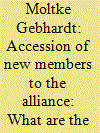

|
|
|
|
|
| Publication |
July-Aug 1997.
|
| Description |
4-9
|
|
|
|
|
|
|
|
|
|
|
|
|
|
|
|
| 15 |
ID:
167291
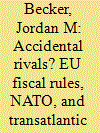

|
|
|
|
|
| Summary/Abstract |
Both theorists and practitioners continue to show interest in transatlantic burden-sharing. Resource allocation choices – both to and within defense budgets – are grand strategic choices, and membership in alliances and security communities affects how states make those choices. International security and political economy scholarship offers plausible explanations for transatlantic imbalances in military expenditures. However, NATO allies and EU member-states have pledged to one another not just to spend more on defense, but to allocate more defense resources to equipment modernization. Current scholarship does not fully explain the sources of such within-budget choices, which would help anticipate the likelihood of such pledges succeeding. Building on work by security scholars, defense and political economists, and scholars of interorganizational relations, I argue that stringent fiscal rules dampen the kind of defense spending NATO and EU strategists seek. Governments respond to increasingly stringent fiscal rules by reducing overall defense expenditures, while at the same time shifting existing defense resources to personnel, and away from equipment and operational expenditures. I find evidence in support of this argument by using education levels in the states in question as instruments for fiscal rules. This phenomenon represents a significant risk for important transatlantic strategic initiatives, namely NATO’s Wales pledge on defense investment.
|
|
|
|
|
|
|
|
|
|
|
|
|
|
|
|
| 16 |
ID:
129880
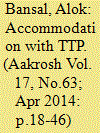

|
|
|
| 17 |
ID:
190362
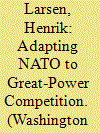

|
|
|
|
|
| Summary/Abstract |
Following Russia’s February 2022 invasion of Ukraine, NATO’s main challenge is to eliminate doubts about its strength and resolve to defend every inch of its territory, as stated in its recently published Strategic Concept, an authoritative document for the alliance’s strategic direction until 2030 (and beyond).Footnote1 By the Vilnius Summit in the summer of 2023, the alliance is set to complete the transition to a new NATO Force Model to deter Russian aggression. However, NATO’s adaptation to the military threat posed by Russia is complicated by the simultaneous need to factor in the rise of China. A rising China is stretching US military resources, and its technological clout creates vulnerabilities for a functioning defense alliance. These are vulnerabilities to which European NATO members must be especially attuned.
|
|
|
|
|
|
|
|
|
|
|
|
|
|
|
|
| 18 |
ID:
124030
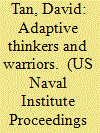

|
|
|
|
|
| Publication |
2012.
|
| Summary/Abstract |
The article offers information on the problem-solving leadership, which the new Marine Officers of the U.S. should have to keep up with the challenge. It states that the Marines Corps will be forced to justify their existence and make difficult decisions, as weakness is a danger to everything the Marine Corps hold. It mentions that Operations Enduring Freedom and Iraqi Freedom are the most complex conflicts faced by the U.S.
|
|
|
|
|
|
|
|
|
|
|
|
|
|
|
|
| 19 |
ID:
139123
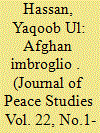

|
|
|
| 20 |
ID:
122758
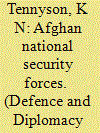

|
|
|